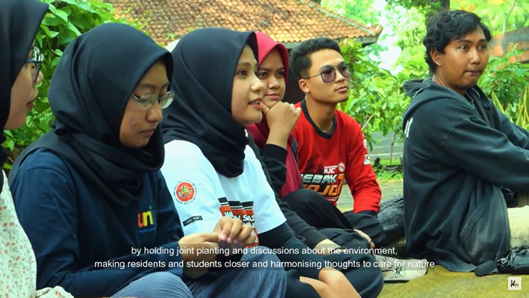Umum
When Women and Nature Are Both Exploited: Resistance from the Forests of Lebak Jabung
When Women and Nature Are Both Exploited: Resistance from the Forests of Lebak Jabung
by Rizka
Mojokerto, East Java. The wounds of the Earth are not so different from the wounds borne by women. Both are often exploited, silenced, and reduced to resources, whether by patriarchal systems or profit-driven industrial forces. In the small village of Lebak Jabung, a woman writer chooses to resist this double injustice through ecological activism and critical literacy. Her struggle, alongside that of the villagers, becomes a voice for both Mother Earth and the many women whose care and resistance often go unseen.
The expansion of the global population has sharply increased the demand not only for food but also for housing and industrial development. To meet these demands, extractive industries have encroached upon forests, rivers, and agricultural lands. In Lebak Jabung Village, illegal mining in the upstream watershed area has caused a series of ecological disasters, including deforestation, landslides, and forest fires. The once-protective forest buffer has become fragile, and local livelihoods are in danger.
Mr. Ahmad Yani, a key environmental advocate and the head of the Village Forest Community Institution (LMDH), describes the toll of this destruction. “Pity us as residents directly affected,” he said. Farmers such as Tono now harvest rice only twice a year instead of three times due to damaged land and unstable climate patterns. Reports from the Mojokerto Environmental Agency (DLH) reveal worsening conditions in soil, air, and water quality.
Despite these setbacks, the people of Lebak Jabung have not remained silent. On December 22, 2023, to mark Mother’s Day, they launched a mass tree planting campaign that aimed to restore ecological balance and protest environmental degradation. A total of 60,000 trees were planted in the village forest area. This symbolic act underscored the vital link between nurturing mothers and nurturing Mother Earth, a gesture that challenged the systemic neglect of both.
Among the leading voices in this initiative was Rizka, a young woman writer and activist. Through her ecological writing, she weaves together personal narratives, environmental observation, and gendered critique. For her, writing becomes a tool of resistance and care. She writes not only to document destruction but to provoke awareness and action, connecting the silencing of nature with the silencing of women.
Supported by local cooperatives, student organizations, Mapala groups, and the Alliance of BEM Raya Mojokerto, the tree planting movement also integrated economic justice. Fruit-bearing trees such as durian and avocado were chosen for their long-term benefits, both ecological and financial. The forest is envisioned not just as a space of protection but also as a source of sustainable income for future generations.
In a student forum, Mr. Yani reminded participants that environmental restoration must be a shared mission. “Environmental sustainability is a collective responsibility. We, as the affected community, must actively raise awareness and ensure the continuation of our ecosystems for the next generation.” Rizka’s writings echo this view. For her, ecological literacy is not just about reading books, but about reading the land, understanding power relations, and amplifying community voices. The story of Lebak Jabung is not just a story of environmental collapse. It is a story of resilience, resistance, and replanting. Through 60,000 trees and the voice of a woman writer, a new forest of hope is being grown—rooted in justice, nurtured by care, and defended by words.

